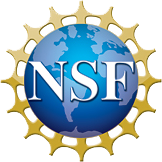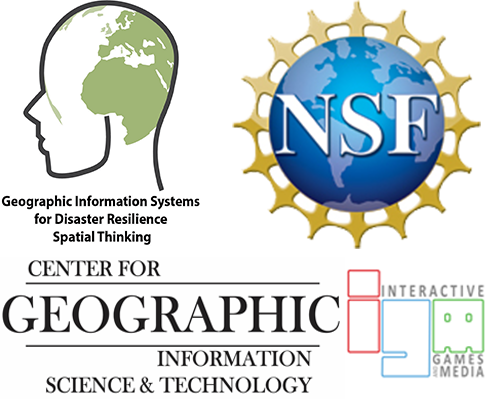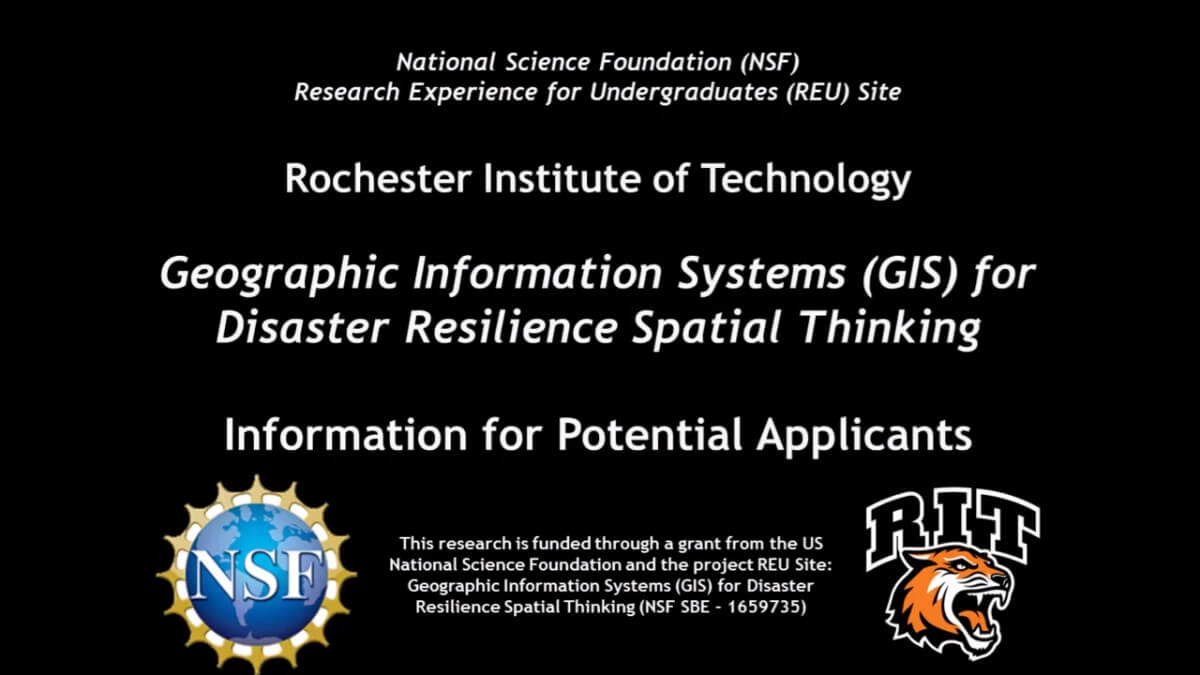NSF REU
NSF REU Site: Geographic Information Systems (GIS) for Disaster Resilience Spatial Thinking
About the Project
This project is funded from the Research Experiences for Undergraduates (REU) Sites program in the SBE Directorate. As such, it has both scientific and societal benefits, and it integrates research and education. This cutting-edge ten-week interdisciplinary REU Site hosted at the Rochester Institute of Technology (RIT) will be the first to focus on Geographic Information Systems (GIS) for disaster resilience spatial thinking. Project objectives are to (1) enable students to research, create, and evaluate serious GIS games for disaster resilience spatial thinking, and (2) create and evaluate an interdisciplinary STEM research environment at the intersections of Geographic Information Science, disaster management, Information Technology (IT), social science and game development. The Site will recruit Geography, social science and IT students. Intended impacts are to create intellectual, methodological and communication foundations for future scientists to conduct interdisciplinary research at the intersections of GIScience, disaster management, IT, and game development. The RIT REU Site will advance discovery and understanding while promoting teaching, training, and learning by addressing pressing national education and training needs for next-generation scientists capable of conducting interdisciplinary, spatially-oriented STEM research focused on GIS and societal disaster resilience. The Site also has several societal benefits such as (1) addressing pressing national geospatial software development workforce needs identified in the Geospatial Technology Competency Model through REU Site efforts focused on spatial computing skill development, (2) disseminating REU student disaster resilience scenarios, datasets and serious game intellectual products for disaster resilience education, training and capacity building, and (3) demonstrating the importance of GIS, spatial thinking, serious games, and disaster resilience to early career scientists to potentially save lives when disasters occur. The REU Site is particularly strong with broadening the participation of underrepresented groups through integration with RIT's National Technical Institute for the Deaf that will recruit and engage Deaf and Hard of Hearing students and faculty in the research. All students will be encouraged to explore disaster resilience issues surrounding special needs people. The Site will enhance infrastructure for research and education - the Site is envisioned as a start to a 10-year international program on GIS, spatial thinking and disaster management that will leverage the PI's existing international NSF research funding and networks.
The fundamental spatial nature of disasters necessitates deeper scientific understanding of how GIS can advance disaster resilience spatial thinking. Serious games are well known for disaster management training and simulation but underused for spatial thinking research. The proposed REU Site will be the first research environment to explore the novel linkage between disaster resilience, spatial thinking, GIS, and serious games via three unanswered scientific research questions: (1) Which spatial thinking components are relevant to disaster resilience, (2) Which GIS tools and visual representations best connect disaster resilience with spatial thinking, and (3) What are the best serious game design practices that incorporate spatial thinking GIS tools and visual representations for disaster resilience to achieve learning outcomes. Mentored student activities involve central hypothesis testing by identifying, designing and creating disaster resilience spatial thinking serious GIS games. The proposed REU Site will provide undergraduate students numerous opportunities to advance this research agenda while themselves benefiting from the research experience.
Video overview of 2018 research activities:
How to Apply
We are no longer accepting applications for the NSF REU Program
For learning materials related to our REU, visit our Research Skills Training Webpage
Before applying to the REU Site, please review this video that contains information for potential applicants:
Information for potential applicants to the National Science Foundation (NSF) Research Experience for Undergraduates (REU) site ‘Geographic Information Systems (GIS) for Disaster Resilience Spatial Thinking’ hosted at the Rochester Institute of Technology.
Before submitting your application, please review the following:
1. The program is only available to current, fulltime undergraduate students at US-based institutions. Students who have already graduated or are planning to graduate before the summer cannot be considered.
2. We can only consider applications from US Citizens and permanent residents.
3. You must have a GPA 3.0 or higher (4.0 scale) at the time of your application.
4. Review the entire application form before submitting your materials. Incomplete or partial applications will not be reviewed.
5. After submitting your application via the Google form using the link below, please submit:
a. A letter of recommendation from your primary faculty adviser that can speak on your maturity, capability, and intellectual capacity for conducting research. Have the letter of recommendation from your primary faculty adviser sent directly to Dr. Brian Tomaszewski – bmtski@rit.edu
b. A letter of recommendation from another faculty member at your institution that can speak on your maturity, capability, and intellectual capacity for conducting research. Have the letter of recommendation from another faculty member at your institution sent directly to Dr. Brian Tomaszewski – bmtski@rit.edu
**Note: To ease in the processing of your recommendation letters, when emailing Dr. Brian Tomaszewski, use a subject line of: RIT NSF REU Site: Recommendation letter for {your name and institution here}. For example, RIT NSF REU Site: Recommendation letter for John Smith – University of Wapno.
**Note: As part of the application process, you are also requried to submit a 500-1000 word statement of interest on your motivation to join the REU Site, including how you see the experience benefiting your educational experience and potential for research in your respective fields of interest. After your statement, please include a maximum 2 page resume that outlines your course work and any relevant research or work experience. The statement of interest and resume should be in one file submission. Note: requires a google account to upload your statement. Document and PDF files only are accepted, 10mb maximum file size.
To submit your REU Application, please visit this link: REU Site Application (requires a gmail/google account).
Timeline
- Full applications (including reference letters) for the 2018 REU Cohort: Friday 7 December 2018 Friday 18 January 2019
- Skype interviews for short-listed applicants: Week of 17 December 2018 28 January 2019
- Notification of selected applicants: Week of 31 December 2018 4 February 2019
- Commitment/confirmation from accepted applicants to participate in 2018 summer cohort due: Monday 7 January 2019 Monday 11 February 2019
Houston Harvey Outreach
We are looking to find partners to work with in Houston, Texas related to the response to and recovery from Hurricane Harvey.
See: RIT Hurricane Harvey Outreach Description (pdf file) for more information.
REU 2019 Cohort
Emily Haberlack, Research Fellow, Iowa State University
Julia Olson, Research Fellow, University of Oregon
Enith Lay, Research Fellow, Monroe Community College
Kyle Pecsok, Research Fellow, Clark University
Jeshua Johnson, Research Fellow, UT Austin
Savannah Baker, Research Fellow, Northwest Missouri State University
Emma Thomley, Research Fellow, Carleton College
Erin Mahoney, Research Fellow, Binghamton University
REU 2018 Cohort
Casey Lane, Research Fellow, Jacksonville University
Stefen Gray, Research Fellow, University of North Georgia
Scott Williams, Research Fellow, SUNY Geneseo
Deborah Orieta, Research Fellow, Syracuse University
Claudia McDaniel, Research Fellow, Monroe Community College
Matthew J. Plummer, Research Fellow, Penn State University
Emily Gawlik, Research Fellow, University of Mississippi
Amy Walker, Research Fellow, Appalachian State University

This research is funded through a grant from the US National Science Foundation and the project REU Site: Geographic Information Systems (GIS) for Disaster Resilience Spatial Thinking (NSF SBE - 1659735).

